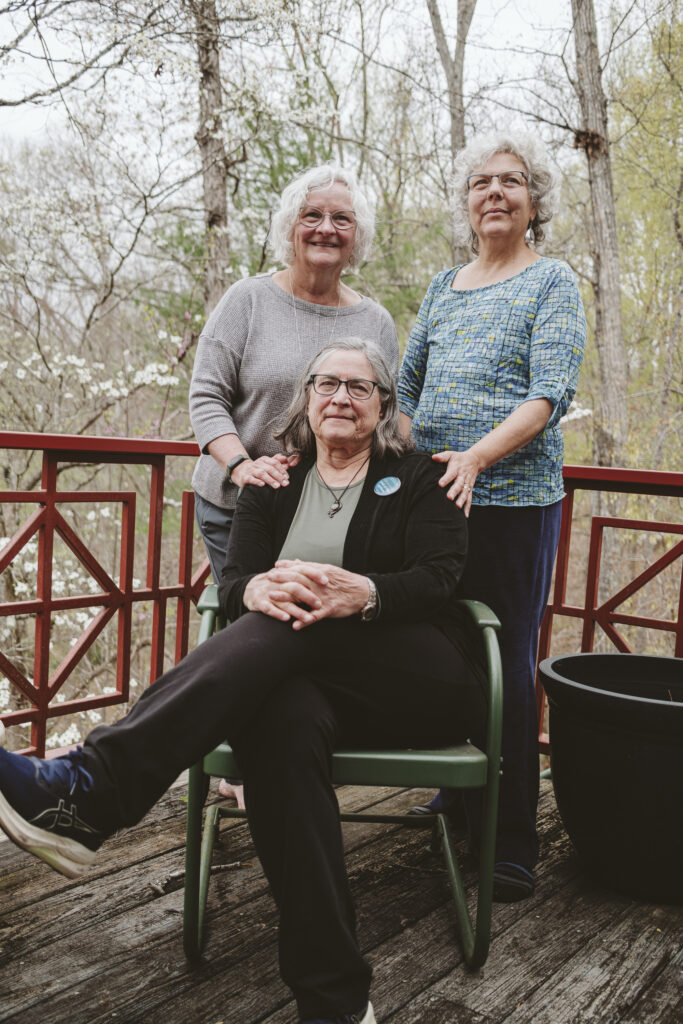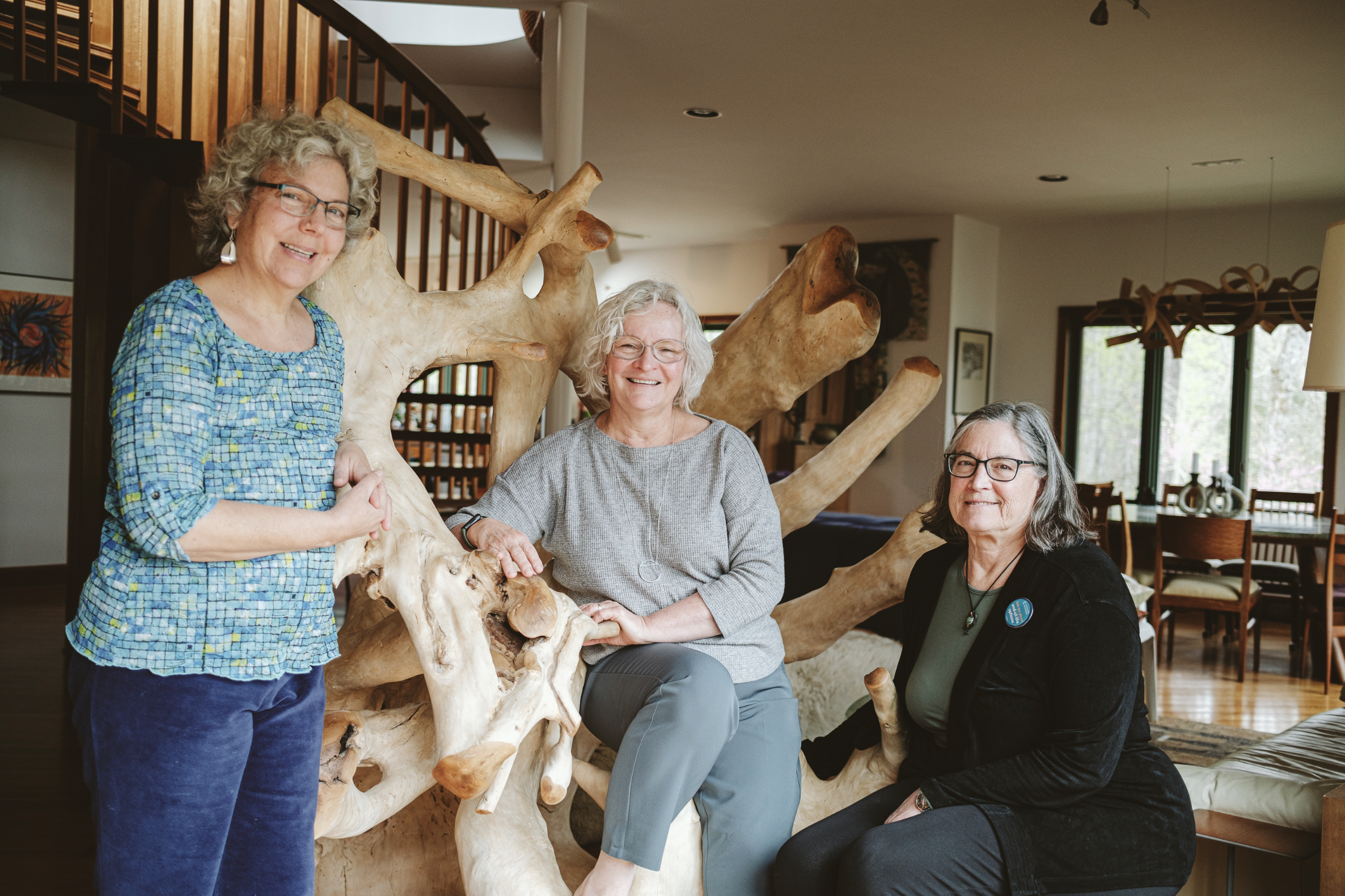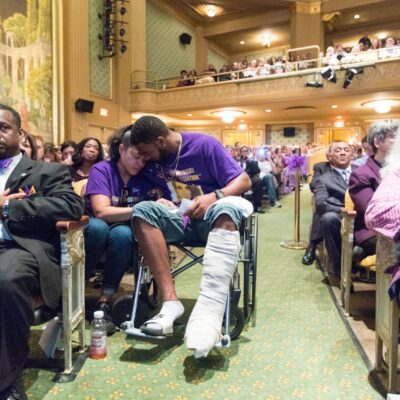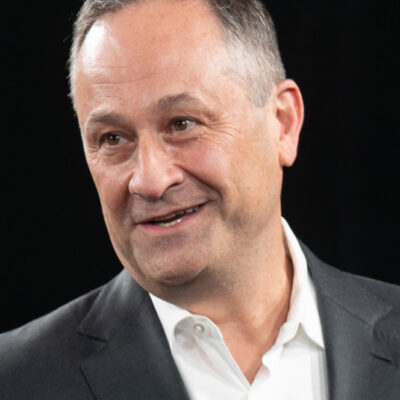How do we come to terms with dying? Three women in our community, friends for decades, have come through their own personal journeys to consider this question, and have decided to help others start their own conversations. Next week, their newly fledged Blue Ridge Action Team, a local chapter of Compassion & Choices, the country’s oldest and largest education and advocacy group around end-of-life care, will hold its first public education session about making personal choices about your life and death.
Leslie Middleton was the first of the three friends to hear about Compassion & Choices. Over her varied career she had been a commercial fisherman and merchant mariner, an ocean engineer working for the U.S. Navy, a massage therapist, and an environmental advocate and journalist. In the last few years, she began volunteering at local hospices and joined Charlottesville Threshold Singers, a group that performs for those in hospice and care settings. “I was looking for something that fit me,” she recalls.
Then, a long-time friend facing a diagnosis of terminal cancer moved to Oregon, one of the first states in the country to pass legislation allowing medical aid in dying. “Her family kept the decision very private,” Middleton recalls, “but that got me thinking.”
Two years ago, another of her friends here in Charlottesville was diagnosed with advancing Alzheimer’s disease. Her friend didn’t want to live through that long and debilitating process, and knew he had to act while he was still competent; he also didn’t want to move to another state, leaving his family, his friends, and his long-time home. He chose the only legal option available in Virginia: voluntarily stopping eating and drinking (VSED).
“I was on his care team, in a supportive role,” says Middleton. “He was a deeply spiritual man, with a community that provided lots of support. VSED is an arduous process.” Her friend’s dying took two weeks, and left Middleton convinced that there must be better options.
Last fall, the Threshold Singers appeared at Deathfest, a program designed to provide information and spark end-of-life conversations, that has been put on for several years in Charlottesville, as well as other communities around the country. The local session was organized by Kate Adamson, an interfaith minister and hospital chaplain, who is also a trained death doula and grief counselor. One of the speakers was Judy Welp from the Norfolk chapter of Compassion & Choices, and that’s when “the hand of … whatever word you want to use” stepped in, says Middleton; her friends Cali Gaston and Amy Chenoweth came up to her at the end of the session and said, “We want to do this with you.”
Gaston had faced the reality of death 40 years before, when she was diagnosed with stage 4 cancer at age 21. “It really was life-changing, to confront my mortality” at that age, she recalls. “I was pretty sure I wasn’t going to live. It meant I was seeing what a huge gift it is to be alive.”
When her successful cancer treatment left her infertile, Gaston tried acupuncture and was inspired by her practitioner to get into the field. “Which was pretty funny,” she recalls. “I hated needles, had no science background, and the best acupuncture school was (150 miles away) in Columbia, Maryland.” She ended up getting a nursing degree to get the necessary science and patient care experience to earn her master’s degree in acupuncture; she’s been practicing for more than 25 years. She also survived another bout with cancer.
Last fall, a friend of Gaston was diagnosed with pancreatic cancer and passed away within five weeks. During those weeks, “(my friend) had very little lifeforce left,” Gaston recalls, “and was very clear about how she wanted to use it. For me, that showed (the importance of) being in the present—how to actually be with the people I am with.”
The day after Christmas, Gaston went from her friend’s funeral to a meeting for the support group of another friend who had stage 4 cancer, complicated by several chronic health conditions. Adamant he didn’t want to spend his last months in constant pain and crisis, her friend chose VSED, where he would have family and a support group around him. His dying took 15 days.
Her own and her friends’ experiences led Gaston to attend Deathfest with Middleton. During the Compassion & Choices presentation about its educational efforts and its public policy advocacy, she says, “I thought, ‘This is what we need to be doing.’”
Chenoweth had come to Deathfest on a different personal path. She worked in nursing for more than three decades at UVA, in hospice work and home health, and in child development—“all of it work around oncology and surgical oncology,” she describes. “Working with cancer patients had raised my awareness and interest in how we approach the issues around dying; these are difficult topics.”
Chenoweth also was thinking about what would be next as she neared retirement. “As I looked around, at my friends and at my parents, I saw the need for openly facing (these issues). My mother is 93 years old; we’ve been having discussions about how she wants to face the end of her life, and it’s been enriching. What do we anticipate? What is a ‘good death’?”
That’s what led Chenoweth to attend Deathfest, which she describes as “a wonderful, upbeat day with people talking about death and grief.” After the discussion session with local death doulas, she went to hear the Compassion & Choices presentation, and was impressed with the breadth of its mission to bring everyone—patients, families, medical professionals, the palliative care community, social workers, etc.—into the discussion.
“That’s my special interest, involving the medical community,” says Chenoweth. From her experience in the oncology community, she’s seen the medical profession’s drive to “treat and keep on treating. When do you allow living to be about quality of life, rather than number of days?”
Launching the Blue Ridge Action Team—actually, revitalizing a group that had been working locally—takes advantage of the special skills of these three women. Middleton has nonprofit experience, and serves as the chapter’s delegate to the state organization; Gaston has both a nursing background and experience in the alternative healing community; Chenoweth has the medical background and the credentials to reach out to that sector. All three have experience and contacts in the palliative care community. And all three have gone through training run by Compassion & Choices to make sure they are knowledgeable on all aspects of the organization’s work and the medical and legal issues involved.
The next big step is the group’s first sponsored event at Charlottesville’s Gordon Avenue Library on April 21 from 6-7:30pm. Compassion & Choices’ Welp will speak about the issues and options surrounding death and dying, the organization’s education and planning resources, its support for patient-centered care, and its work to make medical aid in dying legal in Virginia.
Middleton says the group’s immediate goal is to set up a presentation, discussion, or education session every month. The next event planned will be on June 5 at The Center at Belvedere, featuring a documentary film called Last Flight Home, followed by a discussion led by Adamson on issues around death and grief.
“The three of us have so much we can bring to this work,” says Chenoweth, “and to work with people you know and respect—it’s exciting.”

Right now, 10 states and the District of Columbia have legal provisions for medical aid in dying (MAID); this means 20 percent of Americans live in a state where they can legally choose this option. Eighteen more states are currently considering MAID legislation.
In Virginia, SB280 (often called the Death with Dignity bill) was first proposed in 2019 by Del. Kaye Kory from Fairfax, based on her own experience of witnessing her father’s death from cancer. It’s been filed every year since and, in 2024, passed the state Senate, but was tabled by the General Assembly. With Gov. Glenn Youngkin stating he would veto any such legislation, advocates are holding off to re-propose the bill in 2026. Sen. Creigh Deeds says he voted for SB280 “in spite of concern that such legislation might be abused. The drafting of any similar bill in the future is critical.”
Deeds’ perspective is a common one. Melissa Stacy, Compassion & Choices’ regional advocacy director for the Northeast, says, “This is more complicated than a partisan issue—it’s a personal issue. People have a visceral reaction.” The organization’s website cites a 2021 Gallup poll that found 67 percent of Americans support some form of medical aid in dying—although they are often more aware of the issue than they are of the process, which Stacy says “has some pretty comprehensive guidelines.”
To ensure consistency and counter fears of abuse, Compassion & Choices advocates for MAID laws that set out a specific, stringent process with stages built in for reconsideration. The individual must be an adult who has been diagnosed with a terminal illness leading to death within six months. They must go through an application process that requires a confirmed terminal diagnosis, counseling about their end-of-life options, and repeated review and approval by two qualified medical professionals. They must be assessed to be fully competent to make the decision and take the medication on their own.
Even the phrase ‘medical aid in dying’ raises confusion and concern. Advocates are quick to explain that MAID is not euthanasia, it’s not assisted suicide, it’s not allowing sick people (or their health proxies) access to dangerous medications. It’s also different from the pain management that is a core component of palliative care; MAID provides a person who is already dying access to medication that allows them to choose the time and circumstances of their death.
Stacy says her organization’s research shows that of those individuals who have sought and been approved for MAID, about 30 percent choose not to take the medications. Professionals in the palliative care and medical professions say that simply having the option available often enables individuals to face the dying process with less fear and anxiety. Middleton cites a friend in California (where MAID is legal), whose husband faced a terminal cancer diagnosis and chose that option. “As soon as he had the medication, and the choice, he was comforted,” she says. He died two days later of a heart attack.
But concerns remain. For historical reasons, certain populations—including people of color, the LBGTQ+ community, and the disabled—have issues of trust with the medical establishment. A core component of Compassion & Choices’ work is to address inequities in the nation’s healthcare system to promote equitable access to patient-centered care, and to ensure patients are aware of the full range of treatment options and choices.
Also critical is addressing the conundrum of personal choice in end-of-life care for those with dementia, in which competency is often compromised before a diagnosis is terminal. Research from the National Institute on Aging indicates about 10 percent of Americans age 70 and older suffer from some form of dementia. Compassion & Choices offers a Dementia Healthcare Directive, a document individuals can use to make their wishes clear while they are still able.
In our society, discussing the end of life is never easy, at any age or in any health situation. “People’s fear around the whole subject of death means they won’t consider (their end of life),” says Gaston, “but when you see the very different ways people age and the very different ways people die—it will be unique for each of us.”
“None of us can be sure what we want until we’re in that moment,” says Middleton. “I might want to die naturally, but I’m fervent that the choice should be available.”






